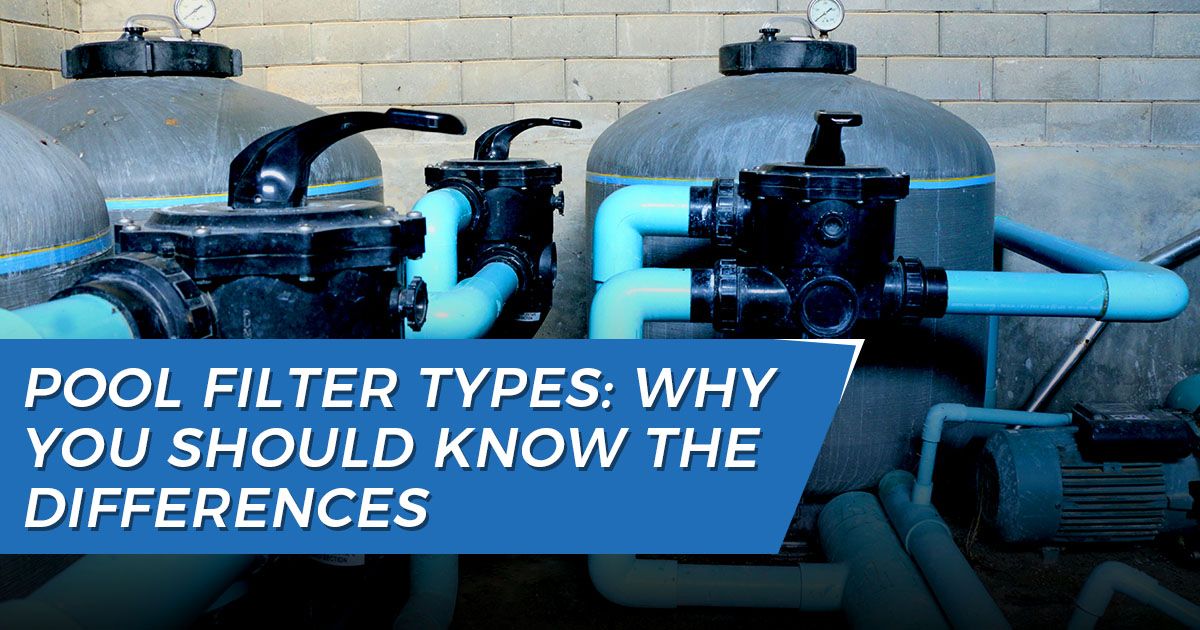Different Types of Pool Filters and How To Choose
Pool filters are a necessary component of any sparkling clean pool. But how can you choose between the different types of pool filters on the market? Each solution offers various advantages and disadvantages, and you’ll want to make the right choice for your unique swimming pool. Join us as we compare the pros and cons of different types of pool filters and how to pick the perfect filtration system to meet your needs.
What is a pool filter?
Pool filters are necessary equipment that removes dirt, debris, and oils from your pool that could affect the water chemistry. Water pumped from the pool flows through one of three types of filters and then back into the pool, clear of any particles that may contribute to a murky appearance. Your pool’s filtration system also encourages more effective sanitation, meaning chlorine and other chemicals can kill harmful bacteria more easily.
What different types of pool filters are available?
The three most common types of pool filters use sand, cartridges, and diatomaceous earth (DE) to remove contaminants from your water. Here are the pros and cons of each option:
Sand filters
Sand filters are known for affordability, simplicity, and effective filtration. Here are several more pros and cons of sand filters:
Pros of a sand filter
- Great for larger pools
- Easy to use
- Low maintenance
- Long lifespan
- Simple backwash process
- Relatively low purchase price and maintenance costs
Cons of a sand filter
- May not remove smaller particles that can make your water murky
- Requires frequent backwashing
- Bulkier than many alternatives
Cartridge filters
If you’re looking for a low-profile solution with a high filtration capacity, you’ll want to consider a cartridge filter system. This compact pool filter, made of tightly woven fiber or polyester, offers a happy medium between the other types available.
Pros of a cartridge filter
- Highly effective for small, low-volume pools
- Can eliminate smaller debris than sand
- Compact size
- Energy efficient
- Saves water since no backwashing is necessary
Cons of a cartridge filter
- Requires frequent manual cleaning instead of simple backwash
- Replacement cartridges are the most expensive filtration medium
Diatomaceous earth (DE) filters
DE powder is made of the fossilized remains of various aquatic organisms. This powerful filtration medium absorbs even microscopic impurities from your water.
Pros of a DE filter
- Removes particles as small as 1 to 3 microns for ultimate water clarity
- Suitable for high-volume pools
- Properly maintained systems may require less water via backwashing
Cons of a DE filter
- Require frequent maintenance and media replenishment
- Handling and inhaling DE powder can cause health issues
- Disposal methods may be restricted due to carcinogenic compounds
- Can be more expensive than other options
How to choose the best filter for your pool
Now that you have a solid understanding of the various types of pool filters, here are a few considerations to keep in mind while shopping for your next water filtering system:
Type of pool you own
The size, volume, and location of your pool will all impact which type of filter you need. Sand and diatomaceous earth can handle high amounts of water and may be the best option for large pools.
On the other hand, a cartridge filter may work better for small to medium pools. Be sure to check the flow rate of any filter to ensure it’s compatible with your pool and pump system, pressure rating, and other specifications.
Maintenance
Some pool owners want to simply flip a switch to backwash their filter and be done with it, while others don’t mind putting in a little elbow grease. Sand is generally considered the filter type with the lowest pool filter maintenance requirements. Cartridges must be deep cleaned once a month and replaced approximately every 12 months.
DE powder requires more hands-on maintenance for optimal performance. You’ll need to add more powder to the tank on a regular basis and clean the filter grids once a year. Without professional maintenance, diatomaceous earth filters may be more prone to failure and clogging.
Costs
While each type of pool filter has various up-front costs, you can expect sand to be the least expensive option overall. However, water filtered through sand will retain some of the smaller particles, meaning your pool water may never be as pure as you’d like.
DE filters can be more expensive than sand and most Cartridge filters. The cost of cartridge filter options is often somewhere in the middle. But no matter your filter choice, be sure to stay on top of regular pool maintenance services to keep your filter running optimally.
Looking for the right filter for your pool? Visit the pros at GPS Pools!
The experts at GPS Pools can help you determine the best type of filter for your needs! We carry a wide variety of filters and filtration systems for in-ground and above-ground pools alike. Browse our expansive inventory or contact us today to begin your journey to a sparkling, clean swimming pool!

